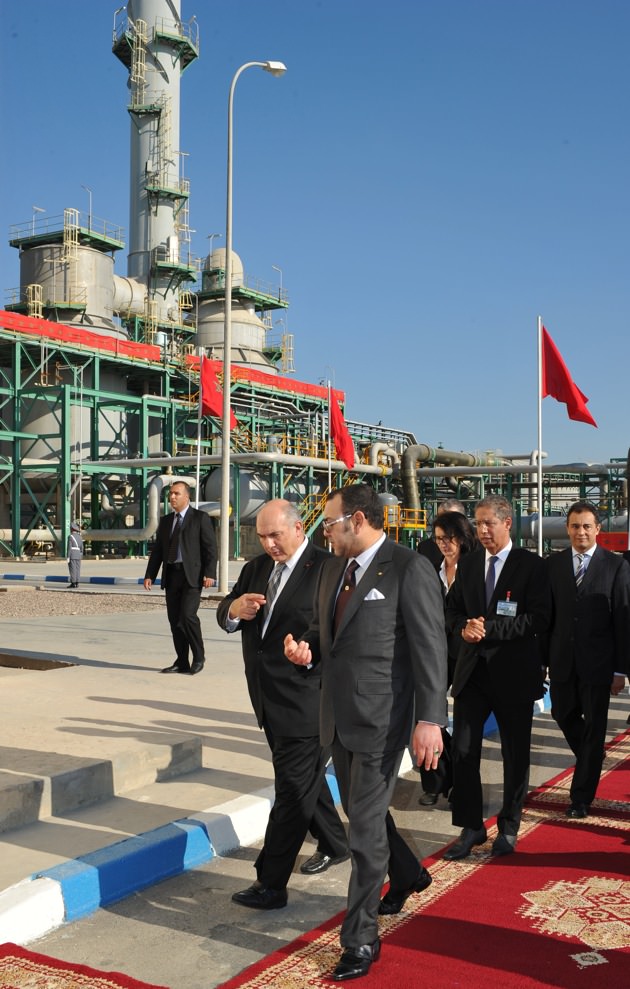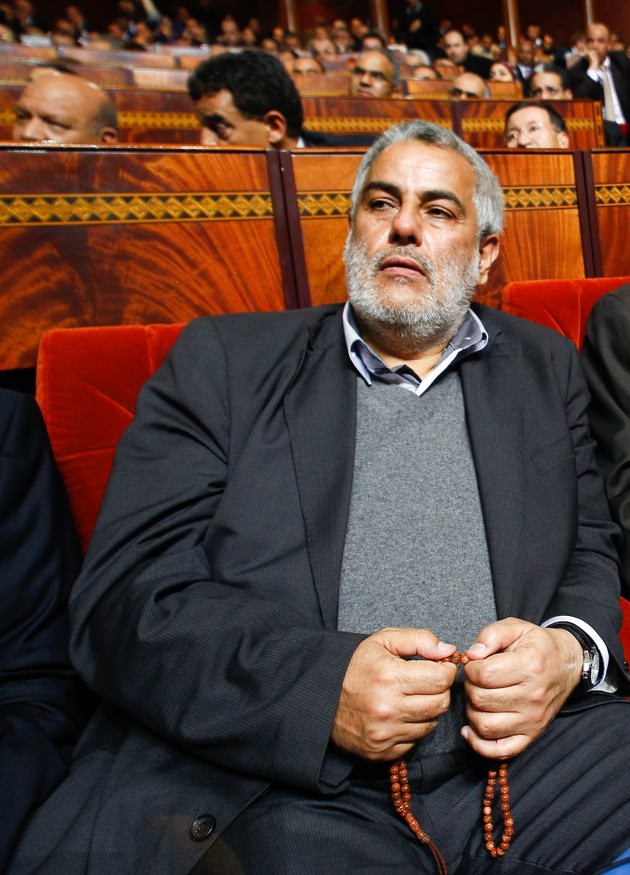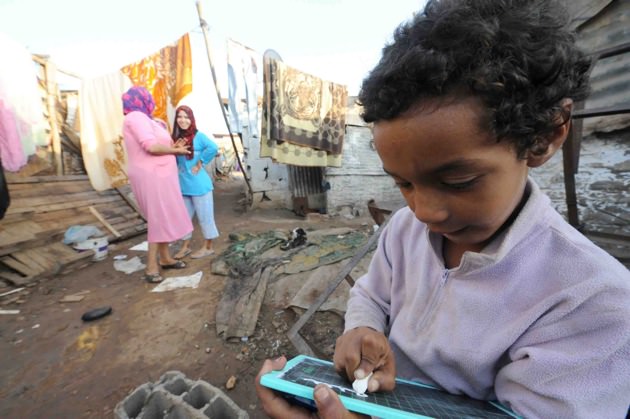Since the Tunisian street vendor Mohammed Bouazizi set himself and the Arab world aflame in December 2010, young men all over the Middle East have tried to imitate him. In no country have they done so more often than in Morocco, where some twenty men, with many of the same economic grievances, are reported to have self-immolated. Five succeeded in killing themselves, but none in sparking a revolution.
It is not for want of causes. Morocco’s vital statistics are worse than Tunisia’s. Its population earns half as much on average as its smaller North African counterpart. One of every two youth are unemployed, and the number is rising: failed rains have cut the country’s wheat harvest in half and have compounded a mounting budget deficit hiked by rising fuel prices and a downturn in tourism and exports to Europe, Morocco’s beleaguered main trading partner. In late May, tens of thousands of people took to the streets in Casablanca to protest the government’s failure to tackle the country’s social ills.
Meanwhile, widely circulated accounts by veteran Moroccan and French journalists describe the cronyism clawing through the palaces. The personal assets of King Mohammed VI—based on his control of the country’s phosphate mines, it is reported —have quintupled to $2.5 billion over the past decade. This makes the monarch of the impoverished realm more wealthy—according to Forbes—than Britain’s Queen Elizabeth II.
But whereas Ben Ali, Tunisia’s policeman, pigheadedly sought to keep power when the streets erupted in late 2010, Morocco’s po-faced but retiring King has kept one step ahead by offering to share it. On March 9, 2011—just weeks after Ben Ali’s exile—King Mohammed unveiled a new constitution that gave up his claim to divine rights as sovereign, but left him as Commander of the Faithful, much—said palace advisers—as Britain’s Queen remains head of the Anglican Church. And while other Arab monarchs, like Jordan’s, dithered about whether to risk parliamentary elections, Mohammed held them quickly and fairly last November; when an Islamist party won the most seats, the King declared its leader, Abdelilah Benkirane, the prime minister.
I first met Benkirane 13 years ago, in 1999, when he was standing for election in the shanties of Sale, a squalid adjunct to Morocco’s serene capital, Rabat, from which it is separated by the picturesque Bouregreg estuary. Unable to deliver running water to his constituents, he ranted against a beauty pageant that the kingdom’s elite were staging in the Rabat Hilton. His core demand was that female contestants replace their swimsuits with kaftans, the hooded woolen tunics that turn hour-glass figures into dumplings. Benkirane won both the campaign and the ballot.
At the time, Benkirane’s claim that he would be running the country within two elections was met with guffaws. Andre Azoulay, the King’s debonair Jewish adviser, summoned me for a reprimand after I reported his prediction on the BBC. “Bullshit,” he pronounced, horrified that an Islamist might ever sully the makzhen, Morocco’s royal establishment. Benkirane was wrong—but only by an election, and he now holds more power than any previous prime minister. At his investiture, he hurriedly pecked His Majesty on the shoulder, dispensing with the tradition of kissing the hand of a man nine years his junior.
One day this spring, I met Benkirane again, by knocking on his front door in Les Orangers, an ordinary middle class neighborhood just beyond Rabat’s medieval walls—he has until now declined to leave his aging town house for the stately home that comes with his office. Unlike the more high-falutin’ Arabic of traditional courtiers, Benkirane—who is popularly known as Benky—speaks in a language Moroccans understand, a dialect called derija, which mixes the various cultures that have swept through its mountains: Tifinagh, the Berber tongue, French, and Spanish.
In a kingdom often depicted as feudal, the prime minister’s common touch has made him unusually popular. The taxi driver who drove me to his front door voted for him despite his general disdain for Islamist busybodies, because he was “a man of the people.” His ministers arrange meetings in station cafes, wear duffle coats, and insist on paying their own bills. Almost unique among Arab leaders, when I called Benkirane with a follow-up question, he answered his mobile phone. When he was busy, he said he would call back, and did.
Career dissidents seem confused about how to respond. Although the large opposition rally in Casablanca in late May revealed the extent to which the country’s economic problems have gone untended, it did not draw the level of support of last year’s protests, when, sparked by the fall of Tunisia’s Ben Ali and Egypt’s President Hosni Mubarak, people took to the streets in some eighty Moroccan towns. Many of those initial protesters have melted away, with the various opposition groups that supported them prone to fighting among themselves. Islamists with republican sympathies have quarreled with members of the secularist opposition after the latter prevented them from holding prayer-protests (a hallmark of the demonstrations in Egypt’s Tahrir Square that brought down Mubarak). Arab nationalists, meanwhile, wrangle with Berbers, who deride Arabism as a colonial implant.
Advertisement
But while Benkirane’s government has for the time being stayed any prospect of a broader upheaval, Morocco is not yet out of the woods. The carping, which Benkirane’s election initially silenced, has returned with renewed vigor as Moroccans ask themselves whether their new constitution was merely cosmetic. Most recently, this view has been confirmed in a battle over who gets to make senior government appointments. Unsurprisingly, the King seems to have won.
“I appoint five hundred of the country’s most senior positions,” Benkirane had insisted to me in March. “The king appoints only thirty-seven.” But those thirty-seven are the most important. King Mohammed remains head of the Council of Ministers, the Supreme Security Council, and the Ulama Council, which runs the mosques. He runs the military, the security forces, and the intelligence. The targets of the February 20 protests—including the interior minister at the time, Ali al-Himma—are firmly ensconced as advisers in the King’s shadow government. Tellingly, when US Secretary of State Hillary Clinton traveled to the kingdom in March she met the King’s foreign affairs adviser ahead of the foreign minister. “The King returns to Morocco, business resumes,” ran the headline in the official newspaper, Le Soir, on June 13, after the King returned from an absence of several weeks in Europe. It was clear who it thought called the shots.
It is hard to ignore the royal court’s smugness at how they co-opted the Islamists to revive the monarchy’s legitimacy at its weakest hour. On the one-year anniversary of the King’s “historic” March 9 speech ceding powers to a prime minister, the Moroccan state press, which usually commemorates royal anniversaries with religious attention, carefully avoided covering the event. “M6 [as the King is commonly known] was shaken to the core, and gave the biggest speech of his career pledging to open a new page,” says Karim Tazi, a politically-active businessman who initially backed the protestors. “The way he changed his mind when the February 20 movement began to lose its way is shocking.”
Benkirane insists he has to “work gradually” to assert his new power and counter corruption, but there are increasing demands that he show it now. All but eleven of the government’s thirty-one ministers come from non-Islamist parties, and several served in the previous government, which Benkirane hitherto decried as corrupt. Aziz Akhennouch, a businessman whose wife recently opened the country’s largest and swankiest mall—replete with Africa’s first Galeriés Lafayette—is his agriculture minister, with powers to distribute state lands. An editor of an opposition Islamist newspaper, whom I knew a decade ago as one of the makhzen’s more judicious critics, is now the information minister, dutifully banning foreign newspapers deemed to disparage the king.
The legislature is similarly subservient. Under Article 41 of the new constitution, their laws can be overruled by royal dahir, or decree. Moreover, despite his gruff reputation, Benkirane’s justice minister has pledged that the government will not tamper with royal prerogative over religious affairs such as the Sharia. Scripting the Friday sermons, he insists, remains the prerogative of the Commander of the Faithful. Even Benkirane seems belabored with doubts, alternately referring to his election by the people, and his appointment by the King.
While Egypt’s election of an Islamist president has given Benkirane’s followers a recent boost, attempts by old regime security apparati to stage comebacks and harness elected representatives across the Arab world have also emboldened the makhzen. The old forces have resorted to their old ways, censoring and incarcerating critics. Hind Zerrouq, an Islamist activist, disappeared on June 13 minutes after calling her husband to tell him she was held in the basement of a state security cell. (Islamist websites said she had formed a support-group for the relatives of detained members of the banned but non-violent Islamist movement, Justice and Charity.) The same week, a court sentenced a blogger who criticized the King to two years in jail for possessing cannabis, a Moroccan cash crop. Meanwhile, dissident Islamists, fearing waning public interest and further state pummeling, have suspended public protests, though they continue to agitate for change more quietly.
Advertisement
But the King has not been able to resolve Morocco’s economic troubles. In his thirteen years on the throne, he has removed many of the shackles his father placed on modernization. Child mortality has fallen 30 percent in five years, and literacy is sharply up from previous appalling lows. Yet development projects seem mostly aimed at the country’s upper crust and at foreigners, who are feted by hoteliers in Marrakesh. Moroccan trains run on time, the streets are spotless, and motorways are being built across the country, while everyday life for many is staggeringly squalid.
The government’s commitment to purchase a high-speed train network from France has become a symbol of the social disparities. At a cost of $2.8 billion, it is supposed to send TGV locomotives darting through countryside that peasants still plow with oxen. The sum equates to 10 percent of the annual budget, or ten times the government’s Agriculture fund for farmers, who comprise 40 percent of the workforce. The Islamist budget minister, attributing the decision to the previous government and to anxious follow-up visits from the French president and prime minister, told me the decision could not be reversed. “We can’t demolish what has already been built,” he said.
But that is precisely what the authorities have done when it comes to unregulated housing for the poor. After a year in which the makhzen stopped enforcing planning permits lest they provoke a Tunisia-scale uprising, the security forces now feel sufficiently emboldened by the stability of the Benkirane government to strike back. In March, riot police armed with sledgehammers began flattening the first batch of what officials say are 44,000 homes built illegally since the start of the Arab Awakening a year ago. A broken trail of rubble stretches from Tangiers in the north via the hillsides of Benkirane’s Sale constituency to El-Jedida, an old Portuguese fortress town a two-and-a-half hour train ride down the Atlantic.
On the edge of nearby Jorf Lasfar, a fenced industrial zone containing a petrochemical and phosphates hub and a port which has pretensions to be the most modernized on Africa’s Atlantic coast, sheep pick through the detritus of nine cinder-block shacks scavenging for edibles smashed by police. The air is acrid with the exhaust of chimney stacks making money for German and American firms and Managem, the mining consortium which forms part of the royal portfolio. “The authorities told us we were squatting in an industrial zone,” says Shakaroun, a jobless thirty-five-year-old, whose family lived in one of the nine. “They erected factories on our land without compensation, and then destroyed our homes.”
The primary school in Shakaroun’s village, meanwhile, is a picture of Dickensian neglect. Its doors hang from their hinges, chairs are missing their seats, flattened cardboard boxes cover holes in the roof, and the playground is a scrap of scrub. And it is just one of more than 15,000 primary schools the local press say lack drinking water and toilets. “Knowledge is the peak of happiness,” reads the Orwellian slogan on the wall beneath the vacant windows of Classroom 3. And it is mockingly called Ibn Battuta, after Morocco’s fabled medieval traveler and man of letters.
No one can remember when politicians from the capital last paid them a visit. Turning their backs on mainstream politics and marches, Shakaroun and his villagers call for direct action to recover their homes, such as picketing the plant, though no one seems to notice. Some suggest violence might work. In the neighboring town of Moulay Abdullah in March, youths with stones confronted riot policemen arriving to demolish their shacks, and torched the governor’s car. In southern Marrakech, protesters attacked a jail; while in a string of towns nestled between the Rif Mountains and the Mediterranean coast, demonstrators clashed with police, and, in a more radical rejection of the government, raised the Berber, or Amazigh, flag.
“The revolt of the little towns is new,” says Lachcen Oulhaj, the dean of Rabat University’s law school. “They are demanding jobs not democracy, but their actions suggest they have little confidence in state institutions.” Worryingly, plummeting revenues and rising deficits mean that this government has fewer resources than the last to raise subsidies and salaries, and buy social peace.
After facilitating elections and introducing a series of constitutional amendments, King Mohammed might have expected a grace period while the country’s newly elected politicians took the flak. But detractors and government officials alike have been quick to lay responsibility for the security forces and the economic disparities at his door.
Ali Anouzla launched a popular news service, Lakome.com, on the Internet in the hope of bypassing state the censors, but the authorities simply frightened off his advertisers. Sitting almost alone in his office in Rabat, surrounded by banks of black computer monitors, even the coffee he sips makes him angry. Every time he adds a spoonful of sugar or drop of milk to his coffee, he says, he is boosting the profits of Société Nationale d’Investissement (SNI), the investment holding firm controlled by the king and his family. State subsidies on fuel, wheat and sugar all help the royal business. So too does a state road-building program, which uses royal cement. “King Hassan, his father, liked the symbolism of calling himself the first peasant, the first sportsmen, and the first artist,” he says. “But with this king it’s real. He really is the country’s biggest banker, biggest farmer, biggest insurer and hotelier.”
Anouzla is not quite a lone voice. At the height of the demonstrations, protestors brandished placards reading “SNI clear off.” And as the government struggles to govern, its frustrations with the makhzen too are growing. Unveiling a 20 percent hike in fuel prices, Benkirane accused the current subsidy scheme of taking money from the poor to give to the rich, not least the King, who has a penchant for luxury cars. “The poor [currently] benefit from fuel subsidies six times less than the wealthy,” he said in an interview on state television on June 6. “The [subsidy] fund has to benefit those who need it the most to restore some social balance.” More directly, at a gathering of party faithful in Rabat in late April he blamed fickle royal advisers for hampering reform, and warned of a possible backlash. “The Arab Spring is not over yet,” Morocco’s press reported him as saying. “It is still wandering about, and may feel like coming back.”
As he drove home from work the night I saw him, he passed scores of graduates nursing their wounds after gendarmes had violently dispersed their protest for government jobs. He stopped, rolled down his window, and apologized. “I’m not one who is beating you,” he told me he said. And then, he called me back to add that no one should blame the King.




